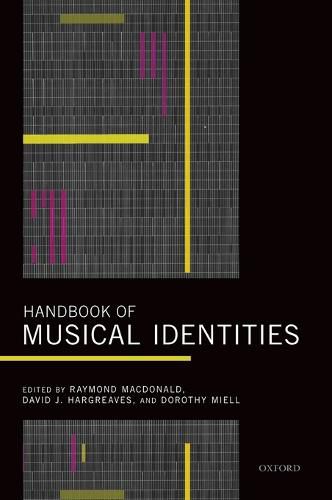Readings Newsletter
Become a Readings Member to make your shopping experience even easier.
Sign in or sign up for free!
You’re not far away from qualifying for FREE standard shipping within Australia
You’ve qualified for FREE standard shipping within Australia
The cart is loading…






Music is a tremendously powerful channel through which people develop their personal and social identities. Music is used to communicate emotions, thoughts, political statements, social relationships, and physical expressions. But, just as language can mediate the construction and negotiation of developing identities, so music can also be a means of communication through which aspects of people’s identities are constructed. Music can have a profound influence on our developing sense of identity, our values, and our beliefs, be it from rock music, classical music, or jazz.Musical identities (MacDonald, Hargreaves and Miell, 2002) was unique in being in being one of the first books to explore this fascinating topic. This new book documents the remarkable expansion and growth in the study of musical identities since the publication of the earlier work. The editors identify three main features of current psychological approaches to musical identities, which concern their definition, development, and the identification of individual differences, as well as four main real-life contexts in which musical identities have been investigated, namely in music and musical institutions; specific geographical communities; education; and in health and well-being. This conceptual framework provides the rationale for the structure of the Handbook.The book is divided into seven main sections. The first, ‘Sociological, discursive and narrative approaches’, includes several general theoretical accounts of musical identities from this perspective, as well as some more specific investigations. The second and third main sections deal in depth with two of the three psychological topics described above, namely the development of and individual differences in musical identities. The fourth, fifth and sixth main sections pursue three of the real-life contexts identified above, namely ‘Musical institutions and practitioners’, ‘Education’, and ‘Health and well-being’. The seventh and final main section of the Handbook - ‘Case studies’ - includes chapters which look at particular musical identities in specific times, places, or contexts. The multidisciplinary range and breadth of the Handbook’s contents reflect the rapid changes that are taking place in music, in digital technology, and in their role in society as a whole, such that the study of musical identity is likely to proliferate even further in the future.
$9.00 standard shipping within Australia
FREE standard shipping within Australia for orders over $100.00
Express & International shipping calculated at checkout
Music is a tremendously powerful channel through which people develop their personal and social identities. Music is used to communicate emotions, thoughts, political statements, social relationships, and physical expressions. But, just as language can mediate the construction and negotiation of developing identities, so music can also be a means of communication through which aspects of people’s identities are constructed. Music can have a profound influence on our developing sense of identity, our values, and our beliefs, be it from rock music, classical music, or jazz.Musical identities (MacDonald, Hargreaves and Miell, 2002) was unique in being in being one of the first books to explore this fascinating topic. This new book documents the remarkable expansion and growth in the study of musical identities since the publication of the earlier work. The editors identify three main features of current psychological approaches to musical identities, which concern their definition, development, and the identification of individual differences, as well as four main real-life contexts in which musical identities have been investigated, namely in music and musical institutions; specific geographical communities; education; and in health and well-being. This conceptual framework provides the rationale for the structure of the Handbook.The book is divided into seven main sections. The first, ‘Sociological, discursive and narrative approaches’, includes several general theoretical accounts of musical identities from this perspective, as well as some more specific investigations. The second and third main sections deal in depth with two of the three psychological topics described above, namely the development of and individual differences in musical identities. The fourth, fifth and sixth main sections pursue three of the real-life contexts identified above, namely ‘Musical institutions and practitioners’, ‘Education’, and ‘Health and well-being’. The seventh and final main section of the Handbook - ‘Case studies’ - includes chapters which look at particular musical identities in specific times, places, or contexts. The multidisciplinary range and breadth of the Handbook’s contents reflect the rapid changes that are taking place in music, in digital technology, and in their role in society as a whole, such that the study of musical identity is likely to proliferate even further in the future.